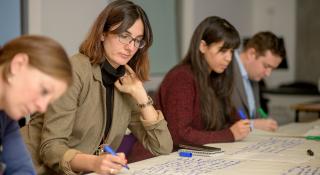
Breadcrumbs navigation
Thinking Inside the Box Framework
In this article Dr J Simon Rofe discusses his project which was funded by a BISA Learning and Teaching Small Grant Award. This project aimed to pilot and evaluate a student-led, co-created programme at the University of Leeds. This project benefits from the foundations laid by Dr Anna Grimaldi (University of Leeds) and Dr Vinicius Carvalho (Kings College London) in Thinking Inside the Box.
The project, titled Thinking Inside the Box Framework, connected student participants as learners with physical and digital archival collections around the themes of transnational solidarity and political resistance to dictatorship and authoritarianism in Latin America. Inspired by the liberatory pedagogical approach of Freire (1968), and the concept of archives as sites of performance-based knowledge creation (Taylor, 2003), the project supported participants to autonomously guide their own learning and skills-acquisition journey by working with historical artefacts and designing, developing, and delivering a programme of events. In April 2023, students launched a series of public-facing workshops, a month-long exhibition and a zine consisting of reflective and research essays.
Through the co-creation and co-curation of our project entitled Thinking Inside the Box Framework our student participants collaboratively designed, developed and delivered a series of outputs exploring the themes of Hope, Struggle and Solidarity. These included a month-long exhibition, a series of public workshops and talks, a zine, a website and social media presence. The project enhanced the student experience through its transformative and active-learning approaches. Students developed synoptic academic skills through independent and collective archival research, interpretation, reflection upon positionality and the co-production of knowledge. Students also gained career-valuable skills such as social media strategies, teamwork, leadership, event management, and public speaking. They also learned how to present themselves professionally by collaborating with formal institutions such as Leeds Art Gallery, and engaging with various publics (families, exiles, academics, industry professionals) in an effective and ethically sensitive way. These outcomes will be empirically assessed and analysed through peer-to-peer interviews.

This non-credit bearing project also provided positive learning experiences that were transferred to credit-bearing modules. The project’s inclusive, collaborative and non-hierarchical design generated an extensive reading list, including audio and visual learning materials, research and training tasks as asynchronous independent study, fieldwork, teamwork experience, and the management, curation, dissemination, and delivery of a significant output. In essence, students produced an assessable piece of work through independent research and collaboration with their cohort and academic staff to develop ideas; they received feedback on written work and agreed upon reasonable delivery deadlines together. There were no identified cases of plagiarism, nor the use of AI-assisted writing tools. The autonomous design of the project meant that students and staff were able to agree upon the location, duration, and objectives of contact time, including knowledge sharing, deadlines, time management and resource allocation in a way that was convenient and reasonable to all, relieving pressure from timetabling and the students’ other commitments, including assessment deadlines and part-time work.
The project also has implications for the pedagogy of International Studies in particular. In a critical dialogue with recent debates in Cold War historiography, one student’s essay, a historical account of the transnational movement, encounters, activities and experiences of Chilean artist Francisco Roca, offered a valuable contribution to our understanding of political activism and cultural production by Latin American exiles in the 1970s. The study of Cold War Latin America generally faces the challenge that first-hand accounts are limited and disappearing along with the first generation of those who lived through the period. Likewise, students in Britain are often limited in their ability to engage with written primary sources in Spanish and Portuguese. Drawing on international networks, staff members made it possible for students to initiate a dialogue with a former exile, political activist, artist and former victim of torture and detention under the Chilean military regime. They also facilitated engagements with transnational artefacts, a collection created in Chile, digitized and stored in the USA and brought to Leeds. This combination of international collaboration and artefacts provided students an intimate identification with the subject material that animated and drove independent research.

To read more about Simon's project see his 2023 article with Dr Anna Grimaldi in the International Journal of Management and Applied Research at https://doi.org/10.18646/2056.102.23-026 ; and for further interest see: Grimaldi A., Smith R.(2024), The Semiotics of Solidarity: Reinterpreting Artefacts of Latin American Resistance in Contemporary Leeds, Alternautas, 11(1), 209_232.DOI:10.31273/an.v11i1.1600.


